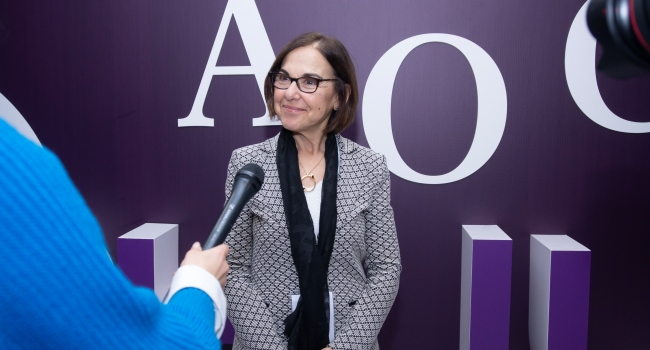- Latest news▼
-
12:16, April 19 Scientists grow human mini-lungs in lab

-
10:23, April 19 JAMA Oncology: Urine test can help rule out high-grade prostate cancer with almost 100% accuracy, study shows

-
18:00, April 18 Daily Mail: Elderly woman in China gets infected with brain-eating amoeba

-
14:19, April 18 Obesity: exercising before breakfast helps you lose weight faster

-
10:42, April 18 The Conversation: childhood trauma can cause pathological hoarding

-
08:37, April 18 Daily Mail: Satiating food reduces cravings for sweets, nutritionist says

-
18:22, April 17 First Armenian-German Conference entitled “Heart Failure Spring School”

-
08:38, April 17 Why do kids usually recover from COVID-19 more easily than adults?

-
14:37, April 16 Daily Mail: intermittent fasting is not suitable for children and women before their periods

-
16:41, April 15 Cell: in carriers of defective BRCA2 gene, sugar consumption increases cancer risk

-
15:04, April 15 305 cases of measles recorded in Armenia so far in 2024

-
14:38, April 15 Food and Environmental Virology: tea contributes to effective coronavirus control

-
12:41, April 15 Daily Mail: vitamin A, B3 and E supplements can be dangerous

-
10:56, April 15 Diabetes Care: evening physical activity is good for the heart

-
08:27, April 15 Women are more susceptible to blood loss and death during bypass surgery than men, researchers say

All materials
It's hard when, despite our best efforts, a patient is not doing well, and that's something we have to deal with, says oncologist Lydia Shapira

The hardest thing about being an oncologist is that it's an emotional job. It's hard when you feel that despite your best efforts and your involvement, the patient is not doing well. And that's something we have to learn to deal with. Lydia Shapira, professor at Stanford University School of Medicine and head of the cancer survivorship program, told NEWS.am Medicine.
"I take care of patients whose condition is very serious. I constantly have to respond to their suffering. There's a lot of emotional involvement in the work. There's also room for frustration when things don't go well, when we can't get access to medication or can't get access to treatment," she said.
The doctor added that an oncologist also needs to be up-to-date on the latest scientific advances, give patients the best recommendations and get the best results.
"In addition, you have to have the skills to recognize what the patient and family really need in order to overcome the effects of treatment and get back to a normal life. You have to understand how to take care of the patient so they can trust you and ask questions. You have to give them all the information so they can take care of themselves and find the best way to stay healthy even after cancer treatment," she said.
Speaking about the cancer survivorship program she runs, Lydia Shapira noted that the number of cancer survivors worldwide is increasing. There are now 18 million cancer survivors in the United States. And globally, their numbers are growing as well.
"So in recent years there's been a lot of interest in thinking not only about how the patient gets care directly during the disease, but also about what happens after the disease. And part of that is because people who have been treated for cancer have undoubtedly experienced trauma and psychological effects, but it's not just about that.
The trauma they experience is often related to medical problems that arise in the future. So we need to develop the ability of caregivers to recognize the complications of cancer treatment, to intervene in the rehabilitation process, to provide education so that patients know what problem they may face in the future," she said. The oncologist explained that, for example, if a patient had leukemia as a child, they may have an increased risk of cardiovascular disease at a young age, so it's important that they know about it.
Lidia Shapira took part in the Third Armenian Cancer Congress in Yerevan.
Follow NEWS.am Medicine on Facebook and Twitter
- Video
- Event calendar
- Archive
- Most read
month
week
day
- WHO: Nigeria pioneers revolutionary meningitis vaccine 1176
- One-third of women experience menstruation-related migraines, most often during premenopause - study 1142
- Daily Mail: vitamin A, B3 and E supplements can be dangerous 969
- Food and Environmental Virology: tea contributes to effective coronavirus control 969
- Women are more susceptible to blood loss and death during bypass surgery than men, researchers say 958
- Cell: in carriers of defective BRCA2 gene, sugar consumption increases cancer risk 941
- 305 cases of measles recorded in Armenia so far in 2024 933
- Diabetes Care: evening physical activity is good for the heart 917
- Daily Mail: intermittent fasting is not suitable for children and women before their periods 751
- First Armenian-German Conference entitled “Heart Failure Spring School” 536
- Why do kids usually recover from COVID-19 more easily than adults? 414
- Obesity: exercising before breakfast helps you lose weight faster 406
- The Conversation: childhood trauma can cause pathological hoarding 397
- Daily Mail: Elderly woman in China gets infected with brain-eating amoeba 371
- Daily Mail: Satiating food reduces cravings for sweets, nutritionist says 369
- Find us on Facebook
- Poll





